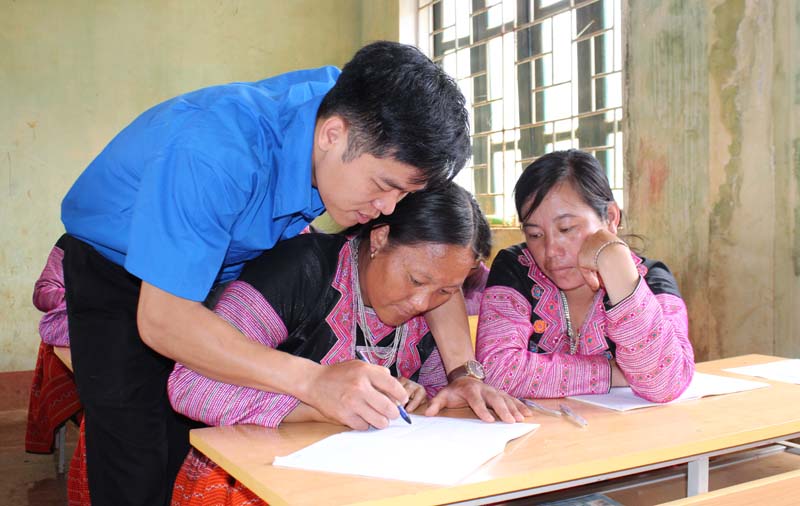
(HBO) - When plums in the orchard are harvested, maize is grown on the green field for maize that is the time when the Mong ethnic women in Hang Kia commune (Mai Chau) can spend time going to school.

Volunteer teachers of Hang Kia B Secondary School (Mai Chau) devotedly
instructed women to write the first words.
With the
desire to bring new life and changes for the Mong ethnic hamlets, the teachers
of Hang Kia B Secondary School has come to every household to propagate and
mobilize local people, especially women to go to school for literal learning.
In early June
of 2018, two illiteracy classes of Hang Kia commune were officially opened with
nearly 60 learners. This class is quite special because learners’ age ranged
from 19, 20 years old to even those who are nearly 50 years old.
Because these
are special classes, it is difficult to mobilize learners to attend classes, to
teach them to remember, to write words is much more difficult. Because no one
is looking for the women’s children, most of them have to take their children
to school with them. In addition, the teachers do not have experience in
organizing and teaching illiterate classes.
In order to
mobilize and attract learners, besides the dedication, enthusiasm,
wholeheartedness of the teacher staff, Hang Kia B Secondary School has prepared
books, notebooks as well as flexible time for organizing classes. Previously, a
number of illiterate literacy groups were organized in the evening but not
being maintained and ineffective. At present, taking advantage of the
agricultural free time, the classes are held regularly on all days of the week.
It is worth mentioning, this is the time of summer vacation, most teachers of
Hang Kia B Secondary School are people in other places to work here, therefore,
Mai Chau district has a plan to support teachers from other schools, who know
Mong ethnic language and understand the culture of the Mong ethnic people, have
had experience in teaching illiteracy to support the school during summer
vacation.
Literacy will
help the local people in Hang Kia have a new awareness, new living way,
starting from eliminating child marriage, not breaking the law. Despite many
difficulties and challenges, but with the determination of both the political
system, the provincial education and especially of the teachers on Mai Chau
highland, there is a hope to open a new life in the hard land by teaching
literacy on the rocky mountain.
Following the direction of the Vietnam Women's Union (VWU) Central Committee, the Hoa Binh provincial Women's Union has proactively and extensively implemented the "Godmother" programme with various practical and creative solutions to support and care for children who become orphans due to the COVID-19 pandemic and other causes. As many as 448 children have received both material and spiritual assistance in the 2021–2025 period.
More than just an information technology teacher, Bui Van Nien is an inspiring figure who has nurtured the scientific curiosity and creative spirit of students in Vietnam’s ethnic minority communities.
Da Bac is the most disadvantaged mountainous district in Hoa Binh province, with ethnic minorities accounting for about 90% of its population. Over the past years, the district has mobilised resources to implement ethnic policies to improve the quality of life of local people.
In recent years, Hoa Binh province has consistently prioritised the protection, care, and education of children, particularly those from ethnic minorities and disadvantaged backgrounds, by creating a safe, healthy, and nurturing environment for their all-round development.
The Steering Committee for Tobacco Harm Prevention and Control of Hoa Binh province, in coordination with the Tobacco Harm Prevention and Control Fund, held a ceremony on May 28 in response to the World No Tobacco Day (May 31) and the National No Tobacco Week (from May 25 to 31). The event was chaired by Nguyen Van Toan, Standing Vice Chairman of the provincial People’s Committee and head of the Steering Committee.
Since 2021, the Center for Industrial Promotion and Industrial Development Consulting (CIIDC) under the Department of Industry and Trade has been implementing a school lighting model as part of the plan for using energy efficiently and economically in Hoa Binh Province in the pẻiod of 2021 - 2025. This model not only aims to improve the learning conditions and enhance the education quality, but it also promotes the message of energy saving, energy security, environmental protection and contributes to the goals of socio-economic development.



